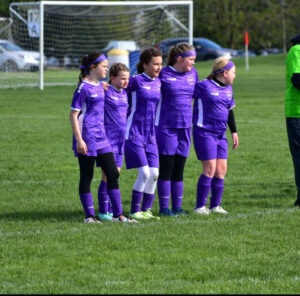Pressure is a Privilege
Original content and full archive posted here: https://onthebrightsidellc.com/f/pressure-is-a-privilege
“Accountable people look for solutions, not scapegoats. They blame no one—not even themselves. If a ‘self-critique’ is warranted, they ask…questions like, ‘What could I have done differently?’ and ‘How can I learn from this experience.”
–-The Question Behind the Question, John Miller
I know in my last entry I promised to dive deeper into how to create environments where players love the sport they are playing, and I will. But we are going to make a quick pit stop at an equally important topic in achieving anything worth achieving: Accountability vs Responsibility. If players are not held accountable to a standard, they don’t grow. But if they are held responsible for results, its not fun. We must get this one right as coaches and leaders. And we must get it right for ourselves before we can lead others.
I want to start by clearly stating what accountability is NOT. It isn’t beating yourself up every time you have a bad game. It isn’t telling your players that everything is riding on them, and they have to perform, or that they disappointed you. And it most certainly isn’t crucifying yourself for every mistake you made on the field as a player, or running yourself down as a coach because you didn’t have the ability yet to succeed in the situation you found yourself in. You need to be able to fail, but not accept failure as your final destination. Most all of what Ive learned about accountability I can sum up in one sentence: You have to be able to hold yourself accountable, but not responsible.
I recently took one of my teams to The Nike Cup, a pretty big soccer tournament in Ohio, with tons of teams in attendance. It was an exciting weekend, in which we found our selves in a PK shootout to decide the championship in our division. I picked my 5 shooters, and within a matter of minutes 3 of the 5 girls were in tears. The pressure was crushing them. In their minds, they were responsible for the outcome of the match. If they missed, it was on their shoulders. The reality of that of course is that a lot of soccer had to be played to get to that point, and everyone’s actions contributed to us arriving at this moment. Thinking quickly of what I could express to them in the 30 seconds I had, I spotted an ill placed Bourbon Chicken food truck right behind the goal. Knowing it to be a likely landing spot of ill-placed PKs, part of my message was that even if we launch all 5 shots into the chicken shack, the pressure is a privilege, it means we got this far and something is expected of us. And that’s awesome! It dosent mean that we wouldn’t then have to work on PKs and figure out what went wrong if we lost, but it does mean that we can just let go and play, appreciating how far we have come. We ended up winning the PK shootout, with the other team putting one into the chicken shack (bringing much animation and excitement from my group) and thankfully could then share some tears of joy. We are still accountable for the shots we took, and some of them made some pretty interesting choices which will need to be addressed, but the time for that comes later. To be held responsible for outcomes that we cant control, either by ourself or others, is crippling. To not hold ourselves accountable for the choices we make and the work we are doing (or not doing), halts all progress. We need accountability, while letting go of responsibility.
As a coach or a leader, the degree to which we can hold others accountable depends on a few things. The first of which, and I think the most important, is the work you have done investing in your players as people and building their value outside of their performance. If you only value their performance, expect them to do the same. When your players know that you love them as people, and that you are there to make them great humans on and off the field, you’ve laid a good foundation, and they will likely be able to accept being held accountable. If you don’t yet have that relationship, expect a lot of turbulence when the moments of accountability come. And, even if you do that well, sometimes people just don’t want to be held accountable and they will hate you for it anyways, just move on. Know it’s part of the journey, learn what you can, and keep going. The second is you must go first. Leadership isn’t pointing to a place and telling people to go there, its going there first yourself, and then making a case for it. If you are not holding yourself accountable, they will notice, even kids. If you are burdened with responsibility for things you can’t control and its affecting how you coach and interact with them, they will notice that too. As Ive stated before, I believe strongly that given enough time and involvement from the coach, teams will eventually take on the personality of their coaches. So, whatever you are asking of your players, you MUST be asking of yourself. That could look like asking a lot of questions you would want them to ask themselves: ‘What could I have done better in this situation? What was something you would like to see more of from me in that, or what would you like to see less of?’ It’s been said (in the same book I quoted earlier) that a poor sailor blames the wind, a poor worker blames the tool, and even so that poor coaches blame the players. If you ask what you could have done better without being crushed by whatever result came, eventually they will too. If you start blaming things you (and they) can’t control, or blaming them, expect them to follow suit.
I think one of the things that sometimes surprises people who know me well outside of coaching when they see me coach, is I almost never will argue with refs, or even voice my distain. Outside of when I’m on the field coaching soccer, people will know if I’m unhappy, and I will usually waste no time addressing things I feel are needed to address (for better or worse is open to debate). But here is the catch, once you start blaming things that you cannot control for your lack of success, progress stops in its tracks. Shut it down, you won’t grow any further. And that is the absolute last thing I want from my players, so I must model that first. When they complain about the refs calls, I always ask them the same thing: ‘Can you control that?’ And when they say no, I tell them to move on and play well enough to beat the other team and the refs if that’s what is needed. And I MUST do the same, or its just words. For some of my college players reading this thinking ‘wait, I remember that time at Grove City when……’ yeah, yeah, I remember it too, I’m growing and trying to do better, give me some grace 🙂 It’s never perfect, but it’s the pursuit of perfection that matters most.
I sent a message this morning to one of my former college players whom I currently coach with, letting her know I was writing this article, and asking for her thoughts. As a player, a leader, and a coach, Lydia is one of those people that consistently outperforms nearly any expectations of her, which has always intrigued me. She shared a moment she remembered well from playing as an 8th grader, where she was asked to take a PK in an important match and missed. The team still won the game, but the moments directly after defined the memory for her. The team and coach rallied around her and helped her feel a part of that victory even though she had missed her shot. That memory could have been defined negatively even to this day if they had responded differently, but instead she felt a part of the success of the team even though she missed her shot. But here is what I believe makes Lydia and those like her able to consistently exceed expectations, in her own words, “Having my team rally around me and encourage me after I missed was one thing, but It didn’t mean I didn’t harbor personal feelings of needing to get better for myself and my team. Nobody made me feel bad, but that dosent mean I didn’t have to get better.” That’s accountability, without responsibility. And that mindset leads to incredible potential.
But there is always a tradeoff, and the same things that make us great, are the same things that left unchecked will destroy us. Great players, and coaches, are often great because they are extremely driven, detail oriented, and expect a lot of themselves. Which often drives them to do far more than is required, watch more film, train when they could sleep, play back every mistake in their head, and a host of other things. But fire can both heat your house and burn it to the ground. And for those high performing individuals, it’s crucial that we give them the tools to manage that fire, rather than always just fanning the flames. Which, and this shouldn’t surprise you at this point, we must do for ourselves first.
So, when you think about the voice you speak to yourself with, and to your teams and players, how many of those questions start with “I” instead of “they”. When managing those high performing individuals (maybe that’s yourself) are we equipping them to manage the heat or just throwing more coals on the fire? If our teams, or teammates, handled accountability the same way as we do now, would that team be thriving and finding its potential, or blaming other people and things? Are we creating a space for ourselves and those we lead to be valued and supported as people regardless of their performance, enabling them to take risks and be more creative, knowing that they will be held accountable, but not responsible? Are we doing that for ourselves???


